The need for play is a fundamental aspect of human development. Despite its importance, many adults feel ashamed to engage in playful activities.
IGBO TRADITION, CULTURAL PLAY AND ITS BENEFITS FOR IGBO CHILDREN AND ADULTS IN DIASPORA.
Conversely, children instinctively combine play and work, even when their schedules are busy. Play significantly impacts a child's development and is deeply rooted in cultural traditions.
For Igbo people living in the diaspora, preserving, and transmitting cultural heritage to the next generation is crucial. The rich cultural heritage of Igbo children is deeply rooted in traditional play and dance. These activities serve as an avenue for children to learn about their ancestors' stories and traditions, develop a more profound appreciation for their cultural identity, and shape their cultural values. However, there is a need for more research on Igbo play and dance in Western play theories.
Children from diverse cultures exhibit unique play patterns that impact their development positively. For instance, Igbo children have patterns of play that positively impact their development, although the play activities are not well-documented by play theorists' developmental norms. Unfortunately, most children's development research textbooks on play focus on European and Northern American perspectives and Western cultures, neglecting the experiences of non-Western cultures. This gap creates an ethnocentric perspective of play, leading to misunderstandings and misinterpretations of Igbo play and dance and its advantages. Research has also found that there are very large gaps in the studies concerning the understanding of trauma and coping mechanisms in therapeutic studies in Igbo and African cultures in general.
Stella (2016) regretfully notes that beautiful and recreational Igbo children's cultural play is fading away due to modernisation. However, modernisation and the development of creative activities do not have to negatively affect the recreational activities that promote Igbo children's development. According to play theorists Piaget and Vygotsky, children learn through play, which involves observation and imitation and is called the Zone of Proximal Development.
Moreover, sociocultural play theorists (Piaget, 1962) and (Vygotsky, 1977) found that children use play, such as make-believe and symbolic play, to demonstrate life experiences. A child's development can only be fully understood when the social, cultural, and historical setting is referred to and understood, such as family history, cultural beliefs, and socioeconomic status.
Migration has risen by 60% in the last few years, and many children will bring their play patterns to new cultures. Therefore, inclusion and diversity are essential in understanding cultural differences in play, enabling appropriate professional practice across schools and children's services. Understanding other cultures' play behaviour and values helps understand other people's behaviours and child-rearing without discrimination.
Traditional Igbo play and dance are vital ways to preserve culture while providing numerous benefits for children's development. Igbo traditional play and dance are not just fun activities for children. They also help in their physical, emotional, and cognitive development. Children who engage in these activities are likely to have better memory retention and cognitive flexibility. Additionally, traditional play and dance often involve memorising steps and patterns, which can help improve children's memory and cognitive processing skills. Furthermore, children who engage in traditional play and dance are likelier to develop better motor skills, balance, and coordination. The rhythmic nature of the dance can help children develop their sense of timing and rhythm, which can translate to improved coordination in other physical activities.
Numerous studies have shown that traditional dance provides a range of mental benefits. Dancing releases endorphins, improving mood and reducing feelings of pain. It also helps to reduce stress, anxiety, and depression, making it an ideal activity for people of all ages. Traditional dance, particularly Igbo cultural dance, has been found to improve cognitive function, memory, and concentration. It supports the relaxation of nerves, classified as body embodiment, similar to the benefits of the well-known Western world's ballet dance. Additionally, Igbo traditional dance supports the relaxation of sensory organs by aiding blood circulation due to using barefoot during traditional dance activities, classified as sensory play. This is an extremely relaxing activity for both children and adults alike.
According to socio-cultural play theorist (Vygotsky, 1977) , traditional play and dance are vital for the emotional development of children. Through these activities, children learn to express themselves creatively, which can help them build self-confidence and self-esteem. They also learn to work together in groups, cooperate with others, and communicate effectively, allowing them to develop social skills that can translate into improved social skills in other areas of their lives. These skills are particularly significant in the classroom or on the playground, as they give children the confidence to teach other children and their friends from different ethnic backgrounds about their culture and the benefits of Igbo cultural play and dance. This is especially relevant in educational sectors and school environments.
According to studies by (Okafor, 2016) and (Kanu & Okoye, 2023), the uniqueness of Igbo cultural play patterns promotes the development of true citizenship through social acceptance. It gives children the satisfaction and opportunity for creative self-expression, allowing them to showcase their strengths.
Igbo children acquire higher levels of knowledge and skills through play and joint activities that involve interaction with experienced adults, caregivers, or peers possessing potential skills. This form of learning is called the "zone of proximal development". By utilising this approach, Igbo children can operate at a level beyond their developmental stage, display resilience, take risks, and function effectively within the zone of proximal development. During Igbo cultural play activities, children can build their self-confidence, express their identity, and surpass their usual abilities, tendencies that are not always achievable in non-play environments. Igbo traditional and cultural play activities have facilitated the development of talents such as musicology, choreography, and local artistry among children, who acquire these skills through imitation and observation of peers and experienced adults. The mastery of skills through the zone of proximal development is achievable with the use of embellished objects from artists and sculptors, singing and dancing games, which have been passed down from generation to generation.
Presently, the Igbo culture has produced valued musicologists, choreographers, and local artists, including art craft, bronze makers, traditional flutes, called Oja, Ogene, Ichaka, and beautiful handmade head beads and belly chains used in Igbo traditional dance.
Igbo traditional handmade musical instruments
Ichaka and Ogene Igbo handmade musical instruments.
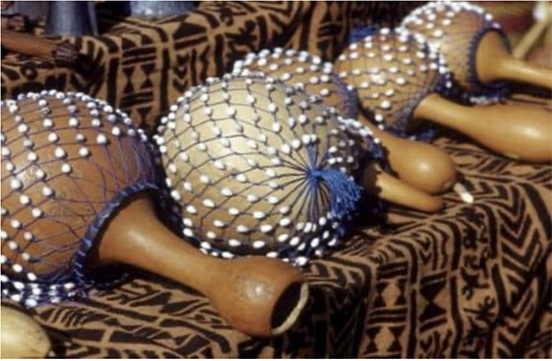
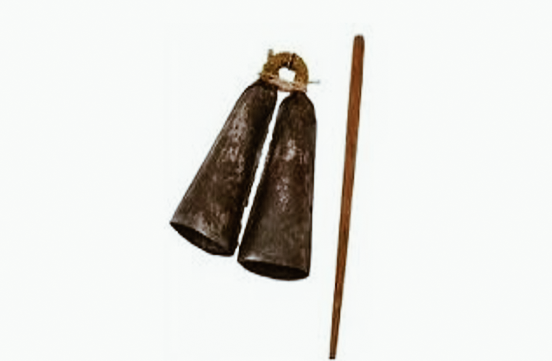
Ogene
(Femi, 2023)
Ichaka
The Igbo culture has a rich and diverse heritage that encompasses a variety of traditional plays and dances. One of the most popular traditional plays among the Igbo people is the "isu-ede," also known as "catcher." This game involves a group of children pursuing one designated child, the "catcher," with the aim of being caught by the "catcher." The objective of the game is for the "catcher" to capture as many children as possible. This game fosters the development of various physical and mental skills, including agility, speed, and quick thinking.
"Odi," alternatively known as "Hide and Seek," is a popular game among Igbo children, played in groups with one child designated as the "it." The game's objective is for the "it" to locate and tag the other children who have hidden themselves. This game encourages children to develop strategic thinking skills, promotes teamwork, and fosters problem-solving abilities.
Okwe, also known as Ncho, is a traditional game in the Igbo culture that involves a wooden board and seeds. The board consists of twelve holes, six on each side, with a larger hole at each end and four seeds placed in each hole at the beginning of the game. The objective of the game is to move the maximum number of seeds into the larger hole at the opposite end of the board before the opponent. Nchokolo is a highly engaging game that can help children develop strategic thinking and decision-making skills. As it requires patience, skill, and strategy, it is an excellent means of cultivating these qualities among the players.
Okwe
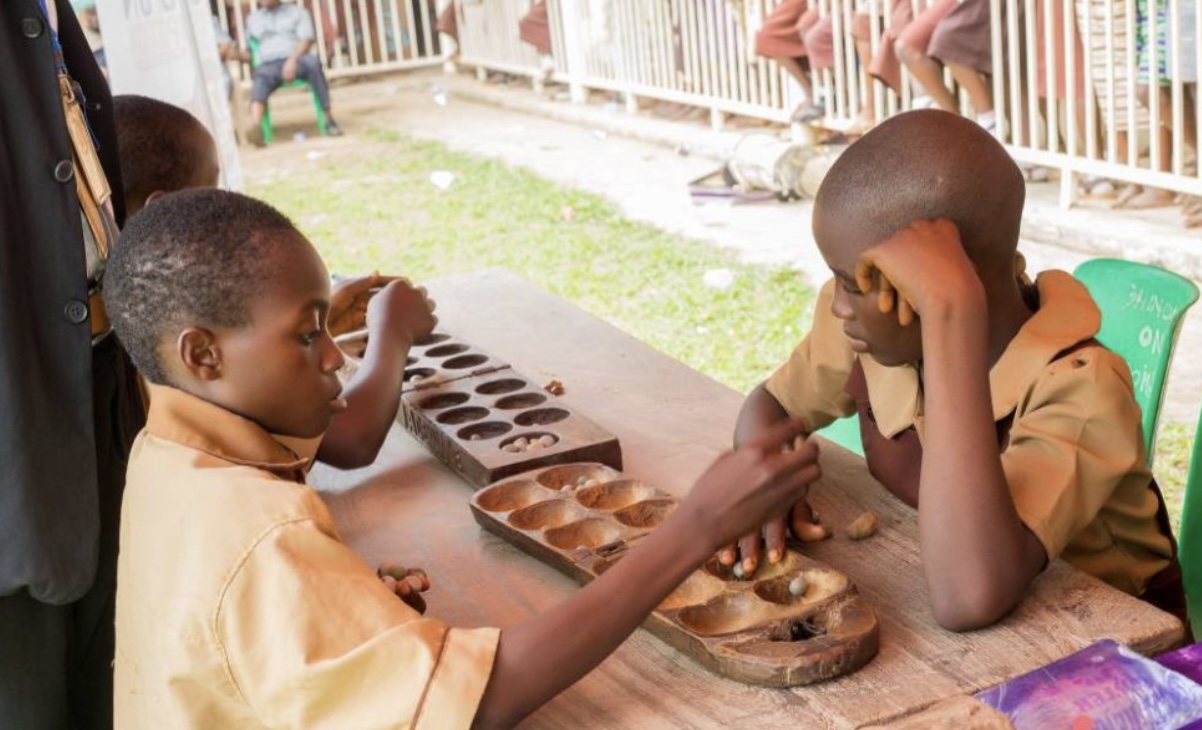
(Nigeria, 2018)
Okwe game, also known as Ncho.
Dance is an integral part of Igbo culture, and the Igbo people have a cultural heritage that includes numerous traditional dances. These dances are often performed during social events, including festivals, weddings, and other cultural celebrations. Each dance has its unique meaning and significance and is typically accompanied by music and drumming. Some of the most popular traditional Igbo dances include Egwu Ogene, Nkwa Umuagbogho, Atilogwu, Egwu Adamma, Egwu onwa, and Egwu Egedege.
Atilogwu is one of the most popular traditional dances performed by both men and women wearing vibrant traditional attire. This dance involves several movements, including jumping, stomping, and spinning, which can enhance children's coordination and balance.
Atilogwu dance
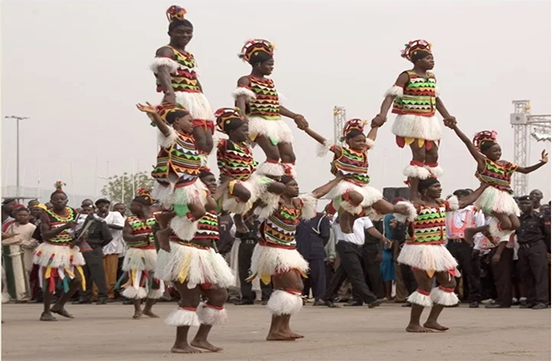
(Omipidan, 2023)
Young Igbo boys performing Atilogwu dance.
Egwu Egedege is another prominent traditional dance that has recently been modernised to fit into modern dance patterns. During marriage celebrations, naming ceremonies, and New Yam festivals, Igbo women wear exquisite traditional attire with handmade beads made from natural materials while performing this dance. Egwu Egedege is a graceful dance that involves movements that can improve children's flexibility and posture.
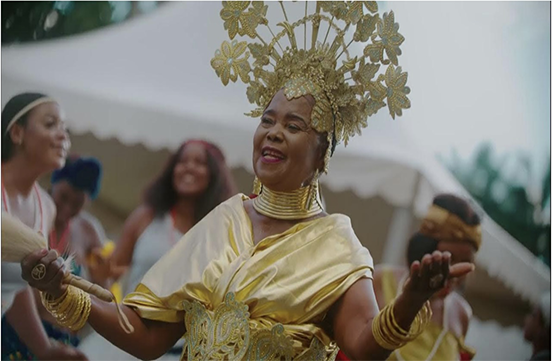
(9jainformed, 2021)
Theresa Onuorah, queen of Egwu Egedege.
Egwu Ogene, also known as Achikolo dance, is characterised by delectable legwork, and is often performed in hip-hop music. The tone of the melody is produced by an ancient handmade musical instrument called ogene, which is played alongside other natural handmade instruments such as Oja, opi, Oyo ichaka, and udu. In ancient times, children and young people often performed this dance during moonlit nights.
Egwu Onwa attire
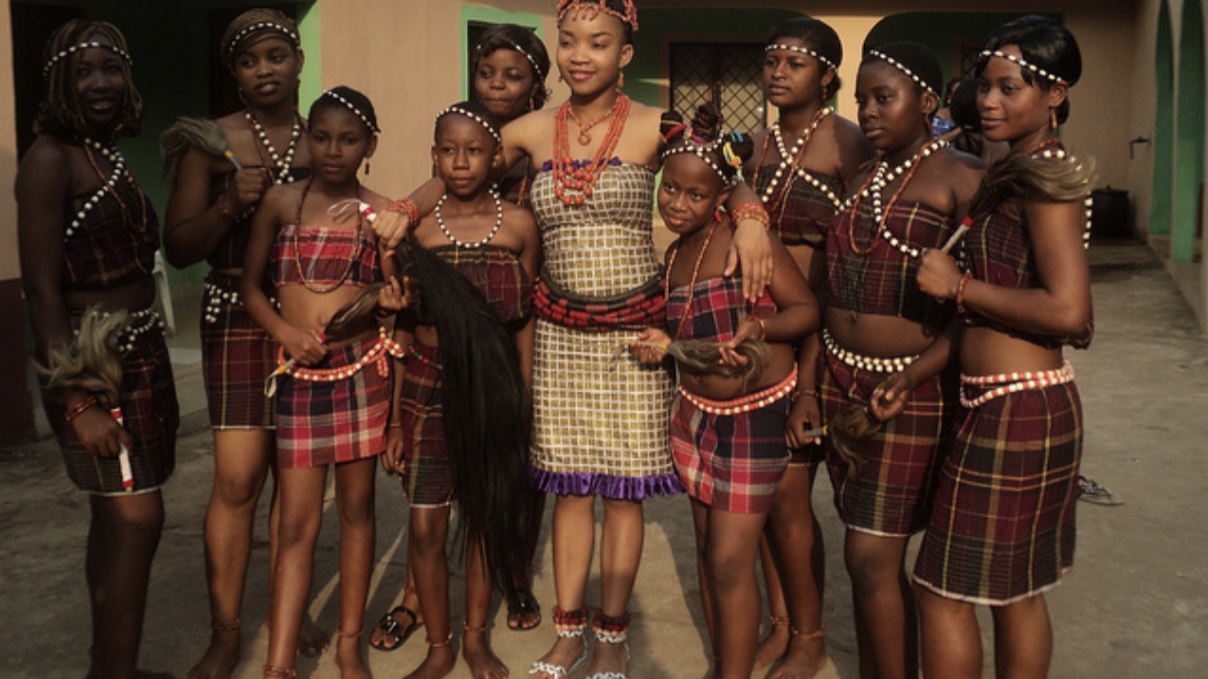
Kaycee (2014)
Young girls in egwu Egedege/egwu onwa attire
Nkwa Umuagbogho
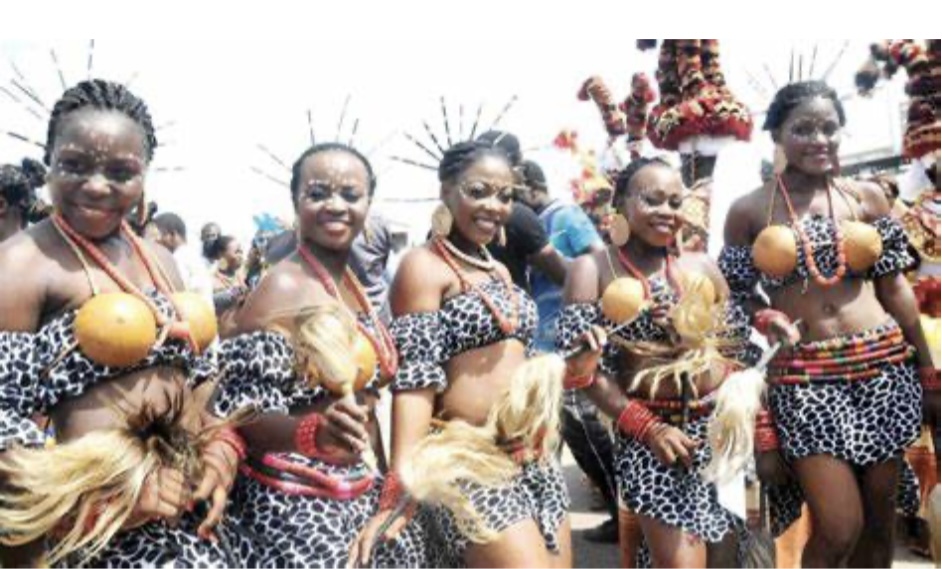
(Udeajah, 28 August 2016)
Young Igbo girls in Nkwa Umuagbogho costume.
In conclusion, traditional play and dance are critical to preserving the Igbo cultural heritage and provide numerous benefits for children's development. As members of the Igbo community living abroad, it is vital to transmit these traditions to the next generation and ensure that Igbo culture thrives. Encouraging Igbo children to engage in traditional play and dance can help them develop physically, emotionally, and cognitively while preserving our cultural heritage.
About the author
Ifemelumma Nweri is a highly motivated caseworker at a BAME charitable organisation, where she diligently provides support and assistance to children and families from diverse backgrounds. Coming from Nigeria, Ifemelumma's passion for her Igbo culture and dance is truly inspiring. She has successfully translated her passion into academic success, earning an MA in Developmental and Therapeutic Play from Swansea University.
Ifemelumma firmly believes in the significance of cultural play and dance in the development of children, and she works tirelessly to promote inclusivity and diversity in her organisation. Her primary objective is to promote cultural play and dance patterns and make these traditions more accessible to everyone, irrespective of their background.
Her exceptional determination and dedication to excellence have earned her extensive admiration, and she has already positively impacted countless children and families. Ifemelumma's work is a shining example of the transformative power of dedication and compassion, and she continues to inspire everyone around her.
9jainformed. (2021). Who is Queen Theresa Onuorah? Secrets People Don’t know about the Egedede goddess. https://9jainformed.com/2021/10/24/who-is-queen-theresa-onuorah/
Femi. (2023, 26 January ). Egwu Nkwa Ndi Igbo: Traditional Igbo Music and Musical Instruments. https://spinditty.com/genres/Egwu-nkwa-ndi-Igbo-Traditional-Igbo-Music-and-Musical-Instruments
Kanu, I. A., & Okoye, P. O. (2023). CHRISTIANITY AND THE FUTURE OF IKEJI FESTIVAL OF ARONDIZUOGU. Journal of African Studies and Sustainable Development.
Kaycee. (2014, June 23, 2014). Igbos and Culture of Playing Under Moonlight (Egwu Onwa). https://obindigbo.com.ng/2014/06/igbos-culture-playing-moonlight-egwu-onwa/
Nigeria, G. (2018). Classic Nigerian Board Games That Have Stood the Test of Time. Nigeria, Guardian.
Okafor, S. O. (2016). ENCOURAGING CHILDREN’S RECREATIONAL ACTIVITIES IN IGBO CULTURE FOR CHANGING COMMUNITIES (Vol. 12).
Omipidan, T. (2023, June 12). Atilogwu Dance of the Igbo People. https://oldnaija.com/2017/09/27/atilogwu-dance-of-the-igbo-people/
Piaget, J. (1962). The relation of affectivity to intelligence in the mental development of the child. Bulletin of the Menninger clinic, 26(3), 129.
Udeajah, O. A. a. G. (28 August 2016). Ndi Igbo: Girl-child and inheritance rites. https://guardian.ng/art/ndi-igbo-girl-child-and-inheritance-rites/
Vygotsky, L. S. (1977). The development of higher psychological functions. Soviet Psychology, 15(3), 60-73.




